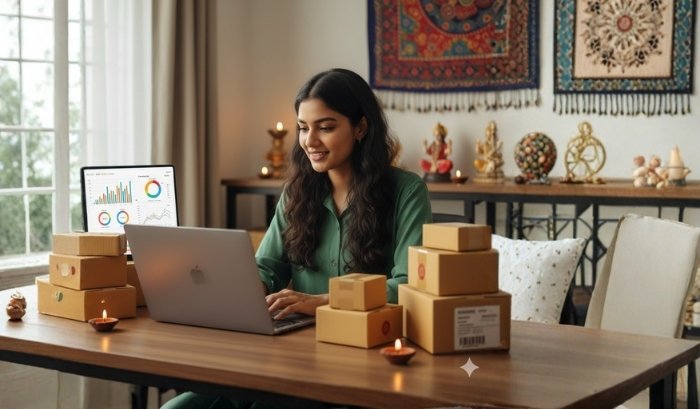Thinking of starting an online business from scratch? The best e-commerce business ideas for beginners in India allow new entrepreneurs to tap into growing digital demand, local preferences, and robust marketplaces like Amazon India and Shopify. This comprehensive guide covers actionable models, cost structures, and real market examples—rooted in India’s dynamic e-commerce landscape.
Let’s discover how you can enter the Indian e-commerce space with a smart strategy, practical tools, and a market-driven approach.
Table of Contents
What Are the Best E-Commerce Business Ideas for Beginners in India?
Answer: The best e-commerce business ideas for beginners in India focus on discovering trending products, selling them on platforms like Amazon India or using Shopify to create your own store, and leveraging affordable sourcing—often through marketplaces such as Indamar. Many successful new sellers start by reselling practical goods for Indian households (like storage solutions or gadgets), integrating dropshipping for a low-risk entry, or comparing prices between Amazon and low-cost suppliers for strong profit margins.
Popular beginner options include:
- Retailing fast-moving products like pest repellent devices, organizers, and home essentials
- Building a Shopify store targeting trending needs visible on Amazon India or social media
- Trying dropshipping to validate product-market fit with low inventory burden
- Sourcing from Indamar (or similar) and selling on Indian marketplaces for maximum markup
Spotting Winners: Trending Products in the Indian E-Commerce Market
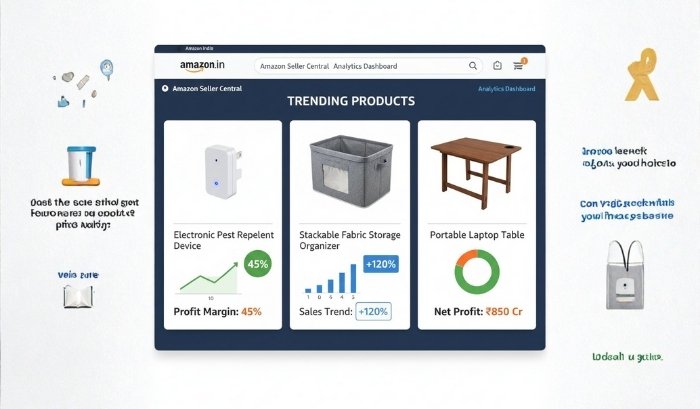
Finding the right products is half the battle. Indian consumers value affordability, practicality, and solutions to daily hassles.
Real Use Case: Cockroach Repellent Device—Appealing to Urban Households
In India, especially during the monsoon, cockroaches are a common nuisance. The cockroach repellent device—an electronic ultrasonic plug-in—has grown popular in metro cities like Mumbai and Bengaluru.
- Amazon India Price: ₹299–₹399
- Wholesale Cost (Indamar): As low as ₹30 per unit in bulk
- Monthly Volume: 300+ orders for listed sellers
Profit Overview: After factoring in Amazon commission, GST, and delivery fees, new sellers often report margins of ₹150+ per sale.
I started with a small batch of 100 devices bought from Indamar. Listing them on Amazon, I targeted urban regions with high insect problems. By writing product descriptions in local languages and showing photos relevant to Indian homes, orders picked up steadily. It’s proof that even simple everyday items can power your first e-commerce breakthrough in India.
Understanding Fees: How Amazon India, GST, and Shopify Affect Your Earnings
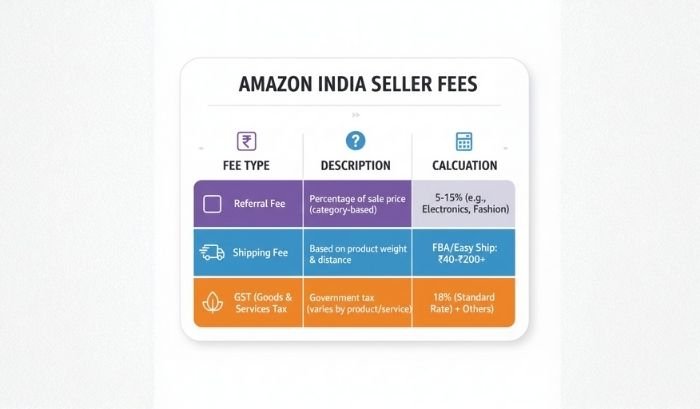
Before scaling up, it’s crucial to understand the fee structures and taxes in India. The Amazon commission structure and GST (Goods and Services Tax) both impact take-home earnings. Shopify operates on a straightforward monthly plan but you’ll need to drive your own traffic.
Amazon India Fees and GST
- Referral Fee: Typically 5% to 15% of sale price depending on product category. For small home items, it’s usually 8–10%.
- Closing Fee: ₹6 for items under ₹300, ₹11 for ₹301–₹500, and up, depending on category.
- Shipping Charges: Typically ₹40–80 for lightweight products if using Amazon Easy Ship or FBA.
- GST: 18% charged on Amazon’s fees, claimable as input credit if registered.
Cockroach Repellent Device Profit Example:
| Item | Amount (INR) |
|---|---|
| Selling Price | ₹299 |
| Product Cost | ₹30 |
| Amazon Fees + Shipping | ~₹70 |
| GST on Fees | ~₹13 |
| Net Profit per Sale | ₹186 |
Selling just a few hundred units monthly can mean real income even for new sellers or students.
Shopify in India: Control and Customization
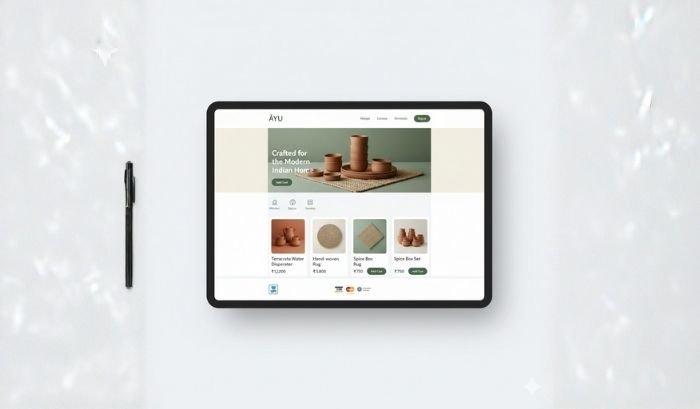
- Monthly Subscription: Starts at $39 (about ₹3,200)
- Minimal per-sale fee (mostly payment gateway, like Razorpay)
- Dropshipping Support: Works with Indian suppliers; also integrates with AliExpress, Oberlo, and Printful
- Brand Customization: Full control of customer lists, store design, and campaigns
New business owners use Shopify to launch niche stores (spices, Ayurveda, fashion accessories) or to test products not yet popular on big marketplaces.
Examples from the Indian Market: Products That Sell
Successful product selection blends local insight, supply access, and consumer relevance.
Self-Adhesive Storage Organizer: Solving the Space Crunch
Storage is a constant challenge in Indian apartments and homes. The self-adhesive storage organizer—ideal for bathrooms and kitchens—has found a loyal customer base.
- Amazon Price: ₹349–₹499
- Indamar/Sourcing Cost: ₹75–₹100 per unit
- Monthly Sales: 1,000+ for best listings
By bundling organizers for family use or offering “Buy 2 Get 1” deals during festive sales, beginner sellers boost cart size and visibility. Written explanations in Hindi or regional languages increase trust and appeal.
Profit Potential: After commissions and packaging costs, profits of ₹120–₹150 per organizer are very achievable.
Laptop Table: Work-from-Home and Online Learning Essential
With more Indians working and learning from home, the market for simple foldable laptop tables surged.
- Retail Price: ₹599–₹799 (Amazon India)
- Sourcing Cost: ₹250–₹350 (bulk deals)
- Typical Amazon Fees: 12–15% commission; ₹34 closing; ~₹70 delivery
- Net Profit per Unit: ₹120–₹160
Local suppliers or marketplaces like Indamar make it easy to keep costs low, while clear targeting (students, IT professionals) can make even small players stand out.
Comparison Table: Top Starter Products for Indian E-Commerce
| Product | Amazon Price | Cost (Indamar) | Net Profit | Avg. Monthly Sales | Pros | Cons |
|---|---|---|---|---|---|---|
| Cockroach Repellent Device | ₹299 | ₹30 | ₹186 | 300+ | Urban demand, repeat | Seasonal peaks |
| Storage Organizer | ₹399 | ₹90 | ₹150 | 1,000+ | Space saver, scalable | Needs clear instructions |
| Laptop Table | ₹699 | ₹290 | ₹140 | 2,000+ | WFH trend, year-round | Larger parcels, more sellers |
Dropshipping and Shopify: Smart Models for Indian Entrepreneurs
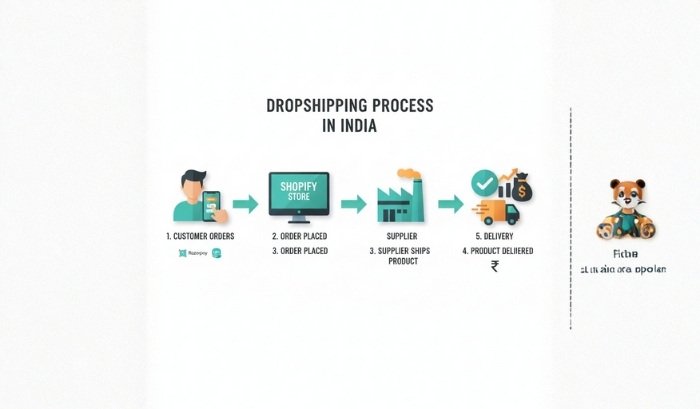
Definition: Dropshipping lets you sell products online and have suppliers ship directly to your customer—no physical inventory needed. It’s ideal for beginners with limited capital.
Shopify integrates with Indian payment systems (UPI, Paytm), enables sales in multiple languages, and supports connections to domestic and global dropshipping partners.
Advantages of Shopify/Dropshipping in India
- Very low upfront cost—just your subscription and minimal ad spend
- Access to a wide range of products (gadgets, home decor, beauty)
- No warehousing headaches
- Fast market testing—if one product doesn’t work, you can switch quickly
Considerations and Challenges
- Margins may be thinner than bulk import
- All marketing is your responsibility—run Facebook/Instagram ads, optimize for Google
- Quality assurance is key—work with suppliers who handle returns and replacements smoothly
Many Indian beginners validate ideas through dropshipping, then transition to local inventory or customized brands as they scale.
If you want to learn more about mental health and yoga , you can visit trusted sources like mindjournal.co, gogonihon.jp.net and ponta.in for in-depth insights and updates.
What Matters Most: Succeeding as a Beginner in India
- Deep Market Understanding: Use Amazon’s Best Sellers, Flipkart trends, social media, and WhatsApp groups to find what people are actually buying.
- Smart Sourcing: Platforms like Indamar offer a price edge, but compare with Indian sources (TradeIndia, IndiaMART) for reliability and speed.
- Compliance: Register for GST as soon as you cross ₹20 lakh turnover; stay updated with platform rules and tax changes.
- Local Customization: Regional languages and trusted payment options (UPI, COD) boost conversions.
- Customer Care: Responsive chat and clear return policies set you apart in India’s review-focused marketplace.
Areas to Watch: Challenges Unique to Indian E-Commerce
- Fierce Competition: Good ideas catch on quickly; focus on brand, reviews, and service to build loyalty.
- Logistics: Rural delivery can be slow; partner with reliable couriers.
- Taxation Complexity: GST filing, invoicing, and TCS (tax collected at source on marketplaces) require basic financial discipline.
- Trending Products Evolve: Stay alert—what’s hot during Diwali may fade post-season.
- Returns Handling: Managing COD returns and damaged products is a key learning curve.
FAQ: Your Top E-Commerce Questions in India Answered
Q1: Which e-commerce platform should I start with in India?
A: Amazon is best for ready buyers and fast growth; Shopify is great for building your brand and owning your customer relationships.
Q2: Is company registration or GST mandatory to sell online?
A: Not initially, but as you hit ₹20 lakh in sales, GST is required. Company formation is advised for scaling, opening accounts, and GST compliance.
Q3: How do I find trending products for India?
A: Check Amazon’s Movers and Shakers, Flipkart charts, YouTube/TikTok reviews, and supplier deals on Indamar.
Q4: What’s the minimum investment to start selling?
A: For sourcing inventory, ₹10,000–₹30,000 can cover small batches; for dropshipping via Shopify, your fixed monthly cost and an ad budget of ₹5,000–₹10,000 is a good baseline.
Q5: Are there Indian suppliers like Indamar?
A: Yes, platforms like IndiaMART, TradeIndia, and local wholesalers in major cities offer similar benefits.
Q6: What taxes should I be aware of?
A: GST is 18% on most e-commerce services/fees and 28% on electronics—track this for all sales and input credits.
Q7: Can I export from India using these models?
A: Yes! Amazon Global Selling and Shopify allow international listings—work with export agents and ensure regulatory compliance.
If you’re looking for professional web development, SEO services, digital marketing, content marketing, link building, or guest posting, please visit or contact LinkLuminous.com. And if you want to purchase high-quality products online, check out TokyoMart.store for great deals and a wide selection.
Conclusion: Your Next Steps in Indian E-Commerce
The best e-commerce business ideas for beginners in India hinge on practical product selection, smart digital strategy, and relentless focus on customer experience. Begin with a single trending item, validate your model, and improve with every order.
A modest investment and genuine market insight can help you build a profitable business—even from home. Leverage India’s digital payments, talent, and growing demand to write your own e-commerce success story.
Author Bio
Ankit Sharma is a digital commerce specialist and startup mentor with over ten years’ experience helping Indian businesses—big and small—launch and grow their online sales. He has been featured by Economic Times, India Today, and Shopify India, and consults for both local brands and cross-border e-commerce projects.
References
- Amazon Seller Central India (2025). Fees and GST Overview.
- Shopify India (2025). Guides for Local Sellers.
- Ministry of Commerce & Industry, Government of India. MSME and Export Reports.
- Indamar and IndiaMART Sourcing Platforms.
- Ankit Sharma’s e-commerce case studies, 2014–2025.


